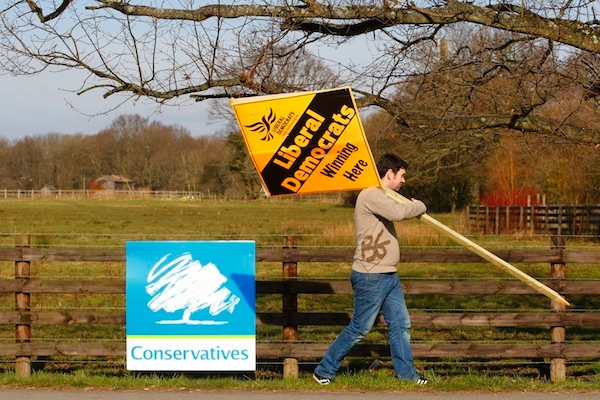Eastleigh could be a turning point in by-election history. Not because the Tories are looking like they may well lose, as the Times (£) suggests this morning, but as the moment the party woke up to the possibilities of digital campaigning.
Online election adverts in UK politics are nothing new – the 2012 London Mayor race saw both Ken and Boris plaster websites (including this one) with a variety of colourful attack messages. What is different in Eastleigh is the drive for data gathering. Take some of the adverts CCHQ are running on the websites of two local papers — the Southern Daily Echo and Hampshire Chronicle:

The main purpose of these adverts is not to encourage voter turnout, nor to get them voting Tory, but to complete the survey. CCHQ hopes to use the information from this form (if they can solve their technical issues) to build a database of voters — including their contact details, political attitudes and postcodes. Come the general election, this will provide them with the ability to target voters on issues that interest them with far greater accuracy than ever before.
The campaign also shows the influence of Lynton Crosby, who has firmly settled into David Cameron’s inner circle. While not exactly pretty, the adverts are concise and avoid openly advocating the Conservative Party. Both ads are pushing Crosby’s famed dog-whistle issues, in this case the EU referendum and benefits. The first has the added bonus of targeting the Ukip vote while the latter highlights bread and butter Conservative issues the party hopes will connect with voters.
Britain has long lagged behind America in the use of voter profiling. This story from Willard Foxton about how the Obama campaign guessed his income is a perfect example. The Tories are not alone in their quest for data. The Times reminded us (£) last week that Lib Dems are trying to capture the Obama magic by using the Voter Activation Network software for the Eastleigh battle. But they still lag behind the Tories on the data, as highlighted in Isabel’s leaked briefing.
Although the Tories still have a decent way to go to reach the level of sophistication seen in American campaigns, Eastleigh suggests they will take data seriously at the next general election. If this is just the beginning of what not just Grant Shapps and Lynton Crosby, but also the other parties can cook up, the 2015 campaign could be the end of blanket political campaigning as we know it and the arrival of highly-targeted messages to address each voter’s interests.






Comments